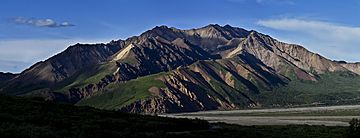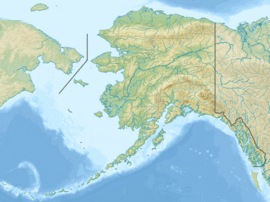Polychrome Mountain facts for kids
Quick facts for kids Polychrome Mountain |
|
|---|---|

Polychrome Mountain from the southwest
|
|
| Highest point | |
| Elevation | 5,900 ft (1,800 m) |
| Prominence | 2,300 ft (700 m) |
| Isolation | 5.39 mi (8.67 km) |
| Parent peak | Sable Mountain |
| Geography | |
| Location | Denali National Park and Preserve Denali Borough Alaska, United States |
| Parent range | Alaska Range |
| Topo map | USGS Healy C-6 |
Polychrome Mountain is a cool mountain in Denali National Park and Preserve, Alaska. It stands tall at over 5,900 feet (about 1,798 meters) in the Alaska Range. You can see it easily from the park road, especially if you're visiting the Toklat River valley. Many tourists enjoy the amazing views of this mountain.
Polychrome Mountain is located near Polychrome Pass and Divide Mountain. Even though it's not the tallest mountain, it rises almost 3,000 feet from the valley floor. This makes it look really impressive! Its name, "Polychrome," means "many colors." The United States Geological Survey first used this name in 1954 because of the mountain's bright and varied rock colors.
Contents
How Polychrome Mountain Was Formed
About 60 million years ago, the area where Polychrome Mountain now stands was a flat plain. This plain had deep layers of gravel and was home to ancient plants and animals.
From Plain to Mountain
Over a very long time, the land began to push upwards and fold, creating mountains. Hot, melted rock, called lava, pushed into the gravel layers. Some of this lava even flowed out onto the surface.
The Colorful Rocks
As the mountains kept growing, fast-moving streams washed away much of the original sand and gravel. What was left mixed with volcanic rocks. The different colors you see on the mountain today come from these colorful lavas, rocks that pushed their way in, and hardened gravels.
Weather at Polychrome Mountain
Polychrome Mountain is in a subarctic climate zone. This means it has long, cold, and snowy winters. The summers are usually mild.
Temperatures and Snow
In winter, temperatures can drop below -20 °C (which is -4 °F). With the wind, it can feel even colder, sometimes below -30 °C (-22 °F). Snow covers the mountain for many months.
Water and Best Visiting Times
Water from the mountain melts and flows into the Toklat River. This river eventually joins the larger Tanana River. If you want to visit or climb Polychrome Mountain, the best time is usually from May through June. The weather is most pleasant then.
Images for kids
 | Precious Adams |
 | Lauren Anderson |
 | Janet Collins |



